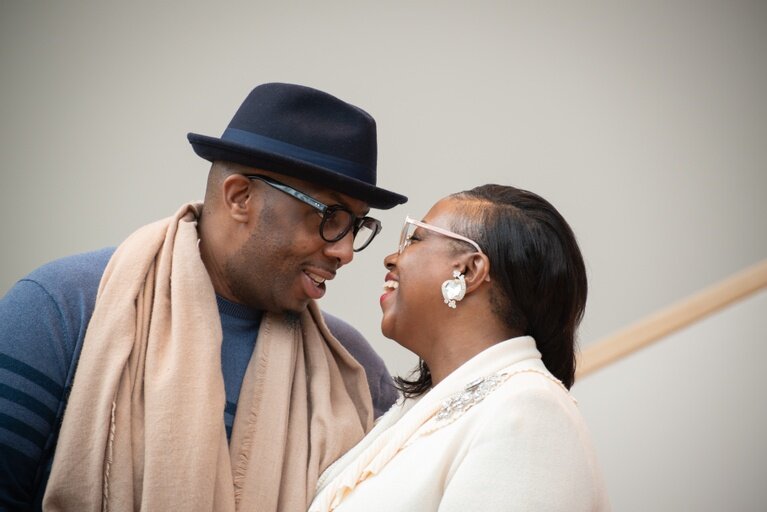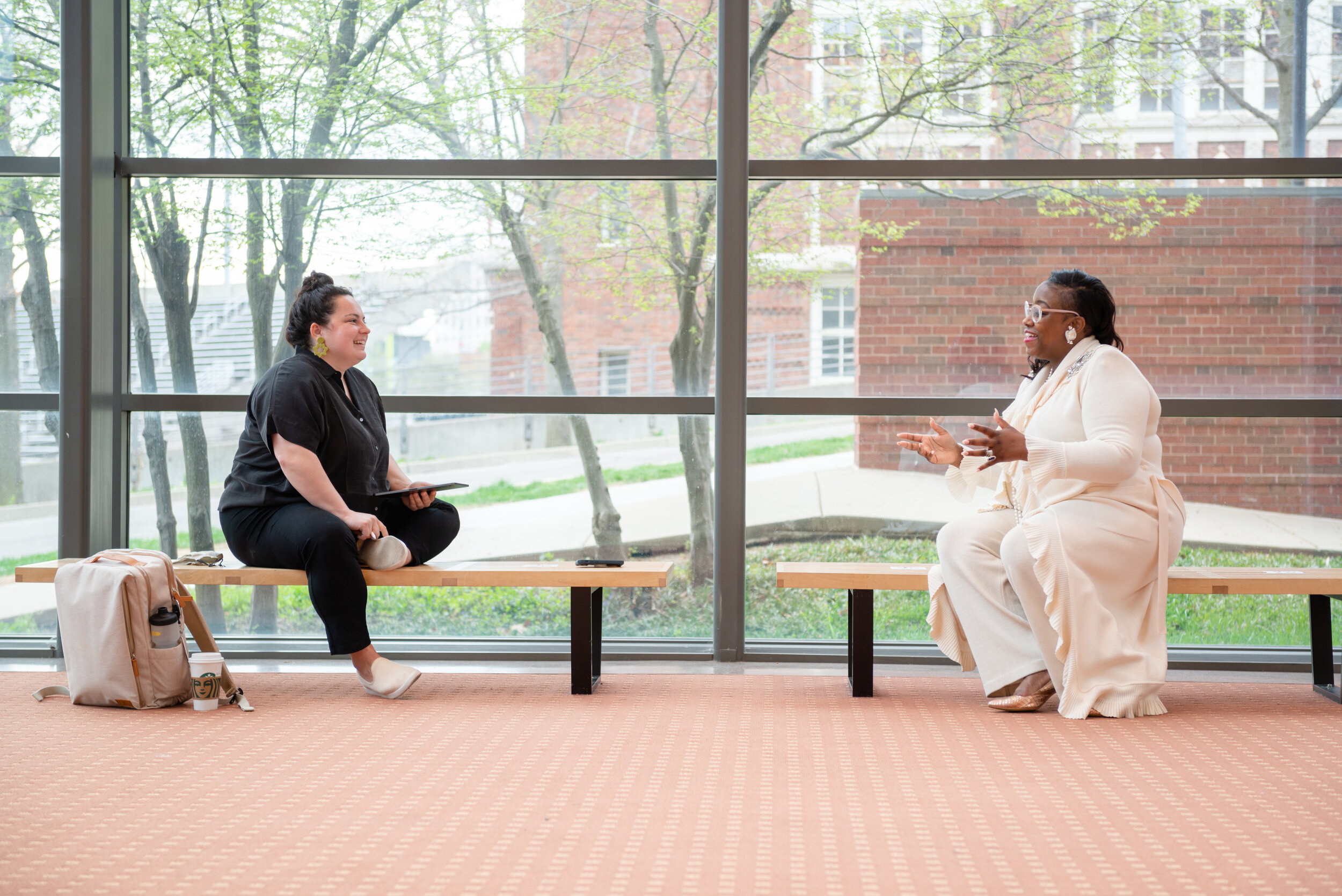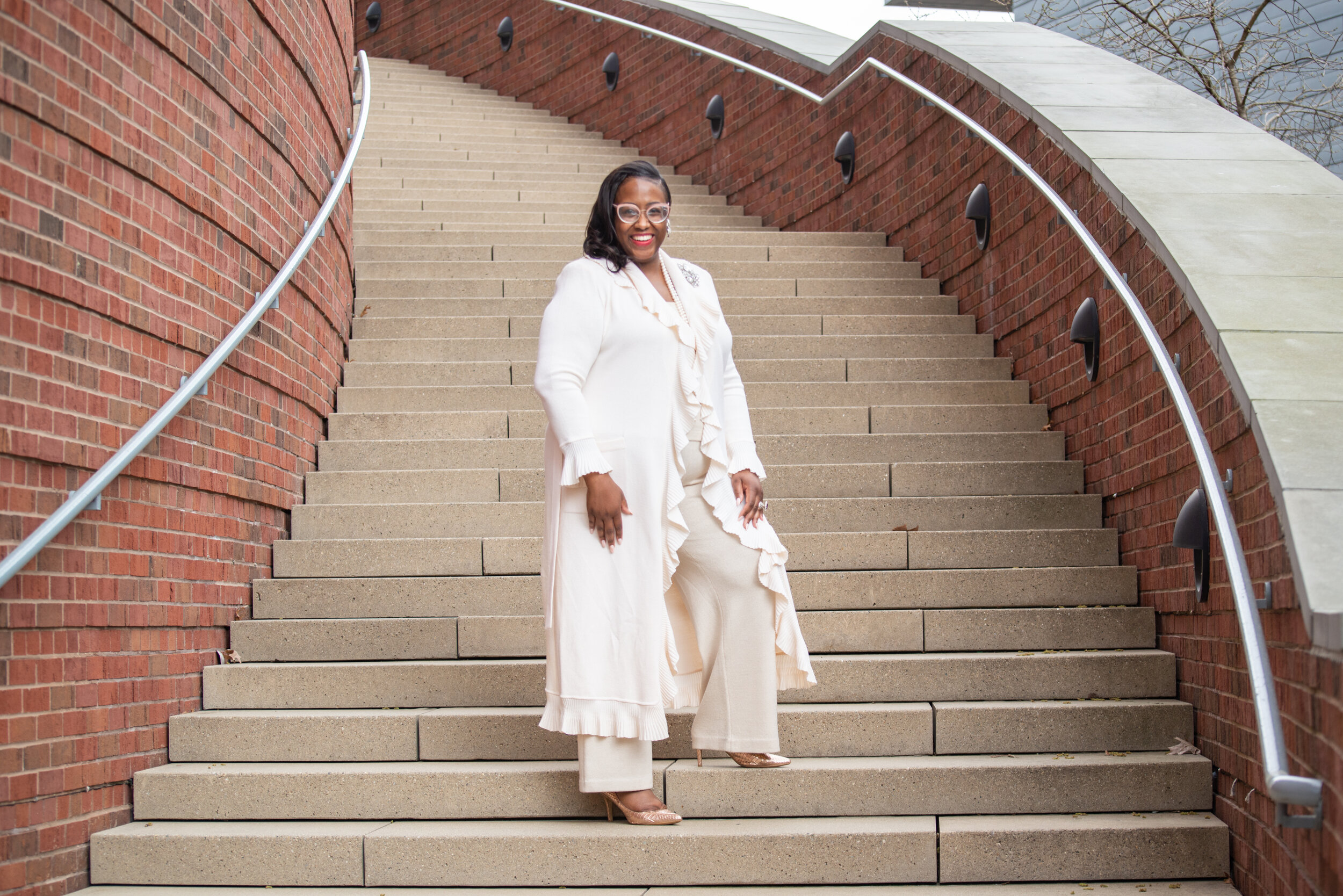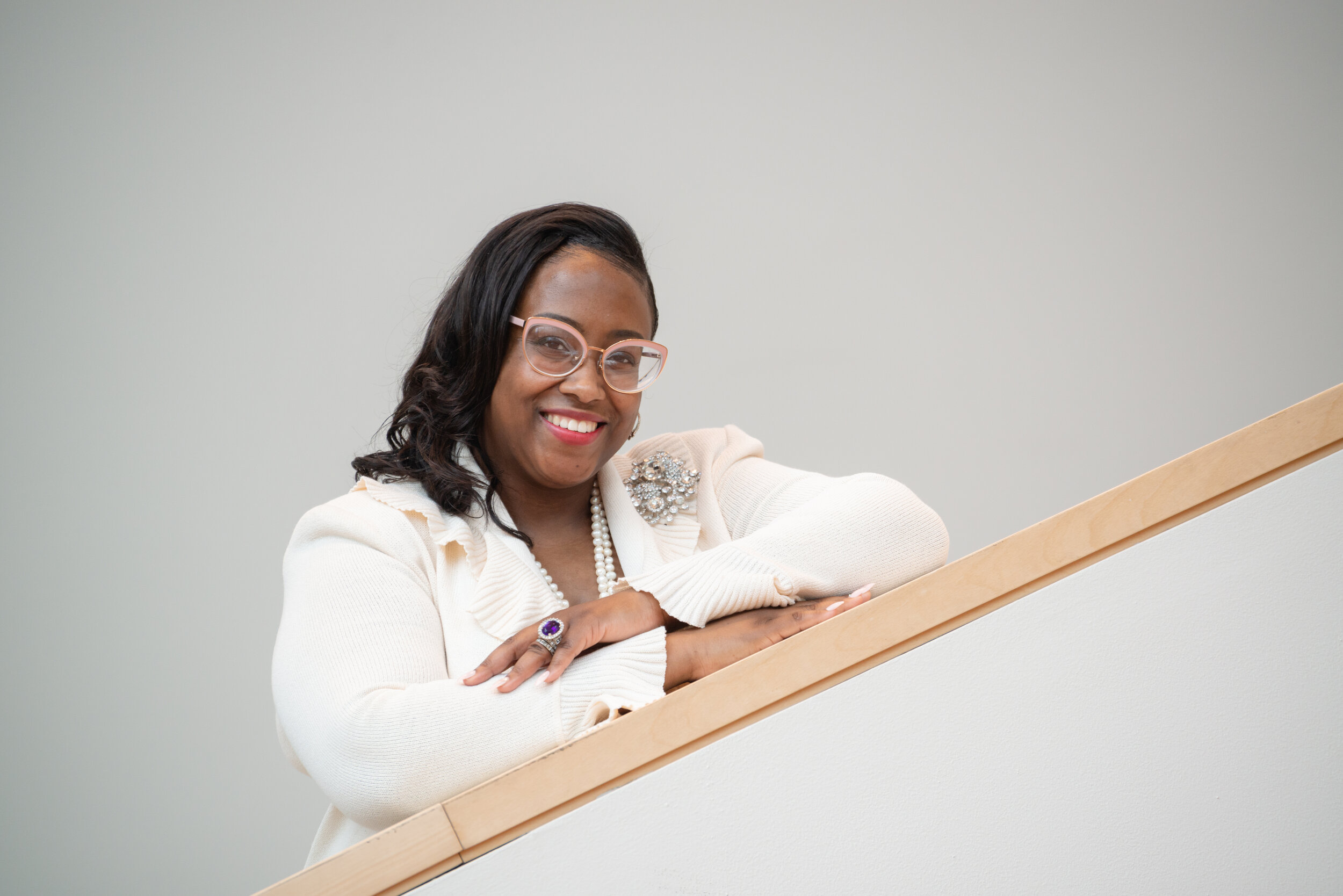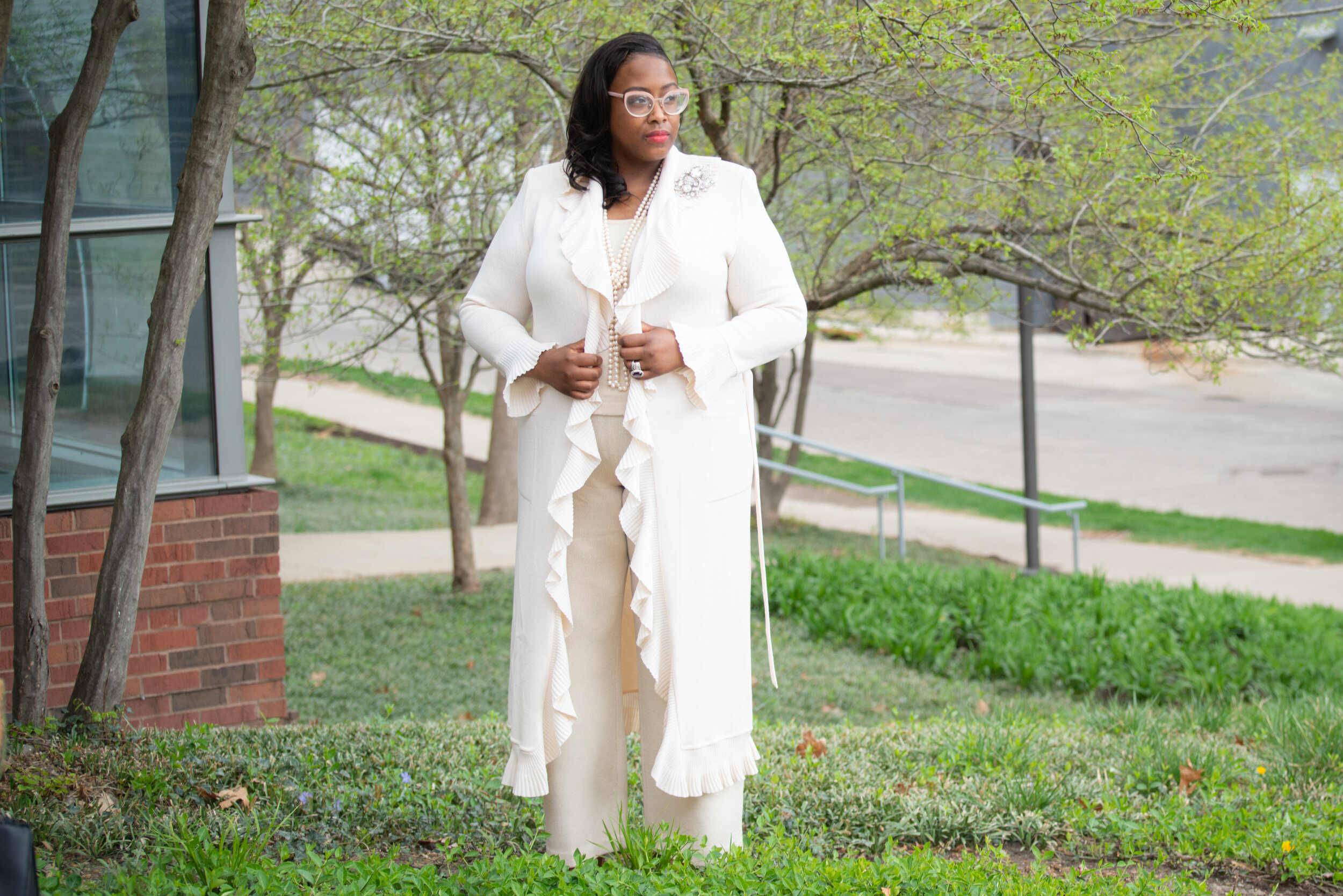Painting with Voices: Jillian Harrison-Jones and Why Representation Matters
Jillian Harrison-Jones grew up in a family of musicians and took lessons from their careers to ultimately find her passion in conducting. She started as a history major, bound for law school, but when asked what she was truly passionate about, she knew it was music. Jillian made a dramatic switch, getting a new undergrad degree and ultimately pursuing her passion to mold voices into one awesome sound.
Jillian speaks passionately about representation and is keenly aware that Black women conductors are few and far between; she strives to be the representation she needed when entering this field. Jillian is just the person we need to challenge our notion of what it means to be a conductor and who can take up that podium. We met Jillian outside University of Cincinnati Conservatory of Music’s Werner Recital Hall to hear more of her story.
Interview by Chelsea Weaver. Photography by Stacy Wegley.
Music has always been a part of your life, but you began your college journey with a law school trajectory. What was your educational arc?
I wanted to be a lawyer. I got an undergraduate degree in history and I had just taken a liking to law. I didn’t know what kind of law I wanted to do; I just wanted to be a lawyer. And then I graduated from Lincoln University and I was like, “I don’t think I want to do that. I like it, but I don’t love it enough to pursue it for an entire career.” I was sort of at this crossroads of, what do I do next?
After I finished undergrad, I went back home to mom and dad in Rochester, New York, to sort of figure things out. At that time I was dating my now husband, and he asked me this very critical question: What are you passionate about? I was like, “Well, music. I love music; that’s what I want to do.” He challenged me to follow my passion – follow that which fuels me to wake up each and every day. I was like, “Well, I dunno. I just got a degree in history and I’m not ready to go to the master’s level in music yet…” and all this, that, and the third. And he said that doesn’t matter: “If this is something you are going to do for the rest of your life, let’s do it.” It was very scary. I essentially had to get a new undergraduate degree if that’s what I was going to do. I was like, “Does that mean this whole first degree was wasted?” And my partner was like, “No, it will all pay off in the end. It’s how you’re getting to your end goal.” It was true – I’m still a history buff. I still use my history degree today.
So, I enrolled in a local college just to see what kind of music courses I could get into. I wanted to sort of get my feet wet and see, “Okay, can I really do this? Is this what I really want to pursue? I know I’m passionate about music, but let me actually take some music courses.” When I was getting my undergraduate degree, I had taken choir and jazz band – the performance aspect of music. I hadn’t taken the music appreciations, the histories, the theories, all of that. So that’s what I did. I dibbled and dabbled at local colleges, and found that I loved this.
In 2012, I officially enrolled in Roberts Wesleyan College in Rochester for my second undergraduate degree. A lot of credits from my first degree transferred over, so all I had to focus on was the music major portion of it – which was a saving grace, because I didn’t want to do another four years.
Tell us more about starting your second degree.
I had to audition to get into the college. My audition day was the same day as the director of choral activities’ audition day. His name was Dr. Jamie Spillane. I was able to sit in on his audition as he worked with the choir, and I was like, wow. He was really, really good. I loved his approach to the music, his technique, how he was able to engage the choir – being personable but getting what he wanted out of the singers. He, of course, got that job, and I, of course, got into the program. And that first year, I clung to him. I was like, “Can you take me under your wing and show me everything I need to know to get to where I’m trying to go?” He was like, “Absolutely.” But he only stayed for one year. After my first year, he left to go to University of Connecticut (UConn) and I had another year at Roberts Wesleyan.
The voice is versatile. You can do so many genres of music, so many different languages – there are limitless possibilities. Being able to shape and mold different experiences and bring out those different experiences within the voice is what drives me.
As I got ready to graduate that year, I was trying to figure out where I was going next for my master’s degree. I applied to about 10 colleges for their master’s programs in choral conducting. One of them was the University of Connecticut, knowing I would really love to study under Dr. Spillane. I saw how intimate UConn was; that’s actually what I loved about UConn – I knew I would get a lot of one-on-one time with Dr. Spillane.
I had gone through the audition process at about four or five universities and colleges, but when I got to UConn, it just felt right. Not just because Dr. Spillane was there, but because the institution felt like home: The people were warm, all of the benefits of the program itself were right up my alley, and it worked out because I wound up getting a full-tuition scholarship. It was funny how it worked out, because he was only at Roberts for one year, and in that one year I got all I needed to know where I needed to go next. So, I went to the University of Connecticut for my master’s degree from 2013 to 2015, and then I wound up here at the University of Cincinnati. I’ve been in this program since August 2015 and I’ll be graduating soon.
Would you talk a little bit more about your family and growing up with music?
My father is an organist and singer and my mother is a singer. My brother is not a singer, but he plays every instrument known to humanity – from percussion instruments to brass instruments. I grew up singing in the church choir in the Black church tradition. I was always exposed to music – all traditions and all genres, from classical music to gospel music, jazz, you name it. I was exposed to it all, so I had a very wide perspective in that regard.
So, you were a singer growing up – what made you pivot toward choral directing?
When I was young, I was very shy and didn’t want to share my gift. I knew I could sing, but I didn’t want people to hear me. So, I got into conducting. It started out with my father. He conducted all the church choirs, so growing up I would take in everything that he would do – not realizing that’s what I would wind up doing down the line. My senior year when I was home from Lincoln University, a historically Black university, I would direct the church choir. And whenever I was at school, I was one of the directors of our gospel choir. That’s sort of how I got my foundation in formal conducting.
The voice is versatile. You can do so many genres of music, so many different languages – there are limitless possibilities. Being able to shape and mold different experiences and bring out those different experiences within the voice is what drives me. It challenges me to be able to teach a choir a foreign language they’ve never sung in before, or a different style of music they’ve never sung before. The versatility of the human voice is what draws me to choral music in particular – being able to shape that sound with my own hands and my own imagination.
It sounds like you’re painting.
Exactly. It’s art. It’s like the choir is my blank canvas and I get to shape, mold, and use different colors, whatever I desire. I get to omit what I want to omit and include what I want to include, all for an end goal. And that end is the final painting, if you will, when the audience gets to come in and hear and see the final product we produced. It’s exactly like painting and sculpting.
You’ve conducted a variety of age groups and a lot of different choirs. What are some of the differences and similarities? Things you like best?
There are benefits to all kinds. I’ve worked with community choruses and festival choruses that usually do more of the big symphonic work; I’ve worked with women’s choirs, and I work with a women’s choir now. There’s so many different benefits to working with different types of groups, group sizes, and genres. I can’t say that I like one more than the other because I like them all for different reasons.
I’ve worked with children’s choirs, with the Cincinnati Youth Choir and in church as well. I will always have a warm and special place in my heart for working with children, especially children who really have a burning passion for music. One of the mottos I live by is: “If you can capture children artistically, then you can inspire them academically.”
Life is not linear. There are many ways to get to where you want.
Children come alive when music is involved. There are so many benefits to music and it then translates to how they are able to perform academically. [I love] seeing those “aha!” moments when they’ve been struggling to get this for so long and then they finally get it. It’s refreshing for me, as the person who has helped them to get there, knowing they’re dealing with all the chaos of the world and school and home life and all this. But when they come to me – when they come to choir – they can let go: just explore and be free. It’s liberating being able to watch and experience that. And then seeing them progress months, weeks, and years to where they want to be. There’s a pride that lives within that type of experience.
You now work with the MUSE, Cincinnati’s women’s choir. Tell us more about that.
MUSE is a feminist women’s chorus founded by Dr. Catherine Roma in 1984. What’s unique about MUSE is that we’re a social justice-centered choir. We are musically excellent in every way, but what separates us from other choirs is that we are socially conscious; our concerts are usually centered around a social justice issue.
We’ve done concerts around human trafficking. We do a New Spirituals Project that focuses on the African American experience and things that have plagued the Black community. We get out into the community as often as humanly possible with small run-outs. And we do two or three big concerts a year.
We are all inclusive: LGBTQIA women, nonbinary women, women in their 70s and 80s to women in their 20s, you name it. We try to be diverse in every way because representation matters. Being able to sing music that you can relate to as a singer, as well as an audience member, matters. Being able to attend a concert where people are talking about things that matter to you matters.
That is amazing. I had no idea it was a social justice-centered choir. How do you create that experience for your audience?
Each concert, we try to collaborate with another arts group in the city. For example, when we did our human trafficking concert, we collaborated with Pones, which is also social justice based. We always try to tell a story. That time, we told the story of four women with an overarching theme of Nina Simone’s song “Four Women,” which is very powerful. We took each woman and told a story about her that was connected in some way to a human trafficking issue. A dancer from Pones illustrated that story through dance, and then we interwove music and narration to further tell this story.
In another concert – our latest New Spirituals concert – we collaborated with Dr. Tammy Kernodle, who is an ethnomusicologist from Miami University. She was our storyteller for that particular concert and she’s an absolutely phenomenal woman. So, for each concert we do, there is a narrative – there’s a storyline. We try to tell a story and use some collaborative effort with another person or arts organization. Our next concert should be in the fall, probably November.
You spoke about the diversity of the choir and how part of your call is to bring the best out of each individual to create something collectively that’s more beautiful than any one person could have delivered alone. What lessons might we learn from that? How can we transfer that to how we live and act and create community?
It’s my goal to teach audience members and community partners that representation matters. For example, MUSE was built on inclusiveness. MUSE was one of the first choirs in Cincinnati that was welcoming of gay women, lesbian women, bisexual women. It allows those who have been excommunicated or hurt by the church because of their sexual orientation, or excommunicated by society because of their sexual orientation, to be free, to be comfortable, and to be themselves without persecution. There is a liberation that comes from knowing that you have a safe space. And we are adamant about diversity and inclusion and making sure that every single person is heard and seen and represented.
It’s my goal to show that what we do within MUSE can translate to the world. I work toward that by continuing to get out there, continuing to collaborate with partners – both in Cincinnati and throughout the nation – to ensure our message is so widespread that everyone knows what we are and what we do. Those types of opportunities can be expanded to every spectrum – we just happen to do it through music.
Choir is such an apt metaphor for that because every single voice is heard, and yet they combine to make something beautiful.
And if you’re not being heard, it’s probably because you’re not singing out enough. What I do is take every single unique voice and craft a sound with what I have. So, if there is one voice that sticks out a little more, I can help them manipulate vowels a little bit better, but one thing I don’t want to do is minimize someone else’s true voice. I want people to be able to sing out and feel that their voice is actually contributing to the sound we’re making. Different choral conductors have different goals for different choirs, but mine is to make sure everyone feels comfortable to sing out and be proud.
I like your goal.
What’s the point of being in choir if you can’t sing out?!
What influential woman has served as an inspiration to you?
Certainly my mother – just having grown up underneath her and witnessing the strength she’s shown in my lifetime.
There’s an African American orchestra conductor by the name of Jeri Lynne Johnson, founder of the Black Pearl Orchestra based out of Philadelphia. She is such a trailblazer. I’ve admired her for many years; she is the representation I needed as a musician, as an aspiring conductor. She’s what I needed to see to believe that I could do this.
As I pursued this career in choral music, in choral conducting, what helped push me even further was that if I did not see myself in the people and the groups I was trying to infiltrate, I could be what someone else needed to see so that they believed that they could do it. I didn’t have the representation; I had to become the representation.
My first exposure to her was maybe around 2010 when I was trying to figure out what route I wanted to take professionally. [My now husband] encouraged me to seek mentorship – find people who look like me who were doing what I would like to do and figure out how they got there. I began to research women conductors, and women educators, and just Black women in the field of orchestral and choral conducting. That’s when I happened upon Jeri Lynne Johnson, followed her story, and learned how she became the Black Pearl Orchestra conductor and founder. She had to make her own path, because as far as minority representation goes, the orchestra world can be brutal. Just following her story and seeing how she got from where she was to where she is now is truly inspiring to me and I have followed her ever since.
I actually had the opportunity to meet her for the first time about a week ago. Having the opportunity to be in the same virtual room with her was quite a dream come true. She is the representation when it comes to being a Black woman who does this work. Whether it’s in orchestra or choral work, we’re far and few in a field that is dominated by men – especially white men. So, it’s refreshing to see someone who looks like you.
Unfortunately, it doesn’t surprise me that there aren’t a lot of Black conductors and fewer, probably, Black women conductors. It feels like there is a disconnect from the gospel tradition, which, to my understanding, is very rooted in Black culture, and the professional white man conductor being the “archetype.” Have you felt that in your career?
Oh yeah, absolutely. It has made it challenging to break through certain doors and sit at certain tables. But all it takes is for one person who is at the table to say, “Come on and join us.” All it takes is one person to say, “You have potential. I believe that you can do this work,” and see that you have what it takes – to see that you have potential to get into conservatories, and colleges, and programs, to get to the next level. Though there are very far and few people that actually would invest in people who look like me; I’ve been honored to be led down a path where people have helped me get to where I’m trying to go.
Representation is so important. Everyone has their own story. Mine is that I wanted to be in musical theater and I never saw a girl living in a larger body in musical theater until my sophomore year when we read the memoir Til the Fat Girl Sings by Sharon Wheatley. It was about a woman who pursued a musical theater career in a larger body and I was just like, “Hell yeah, I can do this too.” What’s your story?
One of the things I grew to appreciate during [my time at] Lincoln University, which is an H.B.C.U., was that a majority of the professors there looked like me. So to go from that into a world dominated by white men was different, but Lincoln was the foundation to show me why representation mattered. Even as I pursued this career in choral music, in choral conducting, what helped push me even further was that if I did not see myself in the people and the groups I was trying to infiltrate, I could be what someone else needed to see so that they believed that they could do it. I didn’t have the representation; I had to become the representation so that other up-and-coming conductors and music educators would want to get into this very competitive field of music. Knowing that they can get into college conservatories as prominent as C.C.M. and the University of Connecticut because I did it.
I essentially had to be what I didn’t see, but also seek out that which I didn’t see by way of Jeri Lynne Johnson, by way of other African American conductors. Another music educator I look up to is Rosephanye Powell, African American composer and conductor. Representation was being able to see people like her and Jeri Lynne Johnson who look like me and are excellent at what they do, who are willing to encourage people and say, “I did this, and you can do it too. Whatever help I can be to get you to where you want to be, I am here for you.” Having that support means the world. So, I essentially have to be what I wasn’t seeing, but still pursue those who I wasn’t seeing – outstretch myself to see who was out there, who did actually look like me.
That sounds like an added layer of pressure. I don’t know if you feel that way, but if you do, how do you deal with that?
I don’t see it as pressure. I see it as an invitation for other people to open their eyes and realize that diversity is growing, or becoming more of an important facet in today’s society. And while I want to inspire up-and-coming musicians and choral directors and Black female musicians in general, I also want to open up the eyes of everyone else to see that we are capable of doing this work – if only you would see past your bias and look at the actual artistry, look at the potential, look at everything else aside from skin color.
Final question: What would you tell your younger self if you could, knowing everything you know now?
Life is not linear. There are many ways to get to where you want. Don’t look at what this person is doing and don’t look at what that person is doing necessarily, but take bits and pieces of what you need. And ultimately craft your own story and craft your own path. It won’t always be easy, but it will always be worth it. I would tell my younger self to just be patient with the path. And know that we’ll get there, wherever there is, eventually.
Do you know an awesome woman of Cincy? Nominate her here! New features launch on Mondays.
Women of Cincy is a certified 501(c)3. This belongs to you. Consider supporting future stories with a donation.




